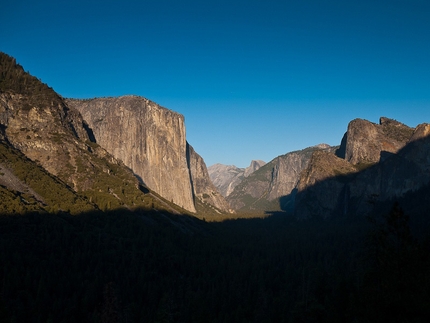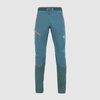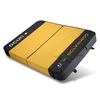Lynn Hill / 25 years ago the first free ascent of The Nose on El Capitan

 1 / 7
1 / 7 Anthamattens
Anthamattens
Not even two hours. 1 hour, 58 minutes and 7 seconds to be precise. This is the almost incomprehensible time that Alex Honnold and Tommy Caldwell clocked up two days ago in setting the new speed record on the nigh 1000m-high The Nose on El Capitan in Yosemite. As with all speed ascents, the duo adopted "everything goes" tactics that involve free climbing, simul-climbing and, wherever necessary, aid climbing and pulling on gear, although according to those who witnessed the ascent what is startling is how much of the route the two actually climbed free.
Bearing this in mind it’s worth taking a moment to consider the monumental first free ascent of The Nose, carried out back in 1993 over a four-day period in mid-September by 32-year-old Lynn Hill partnered by Brooke Sandahl. This ground-breaking, benchmark ascent came about after a first attempt in 1989 with Britain's Simon Nadin, winner of the first-ever Lead World Cup that same year and with whom Hill managed to unlock one of the climb’s crux pitches, the famous Great Roof.
At the time Hill’s first free ascent stunned absolutely everyone. Not content, she upped the ante a year later with another master stroke: setting out in the cool night of 19 September 1994, Lynn partnered by Steve Sutton climbed The Nose free in just 23 hours. This ascent proved to be lightyears ahead of it’s time and, as for want of a better word, a major milestone in the rich history of rock climbing
25 years have passed since that first free ascent in 1993, an eternity for the sport of rock climbing. Although much has changed, some things have stayed the same. On The Nose for example the difficulties certainly have not diminished in the slightest, and proof of this can be found in the fact that during this quarter of a century the climb has been repeated free only a handful of times. In 2005 Tommy Caldwell and Beth Rodden swung leads and free climbed all pitches. A fortnight later Caldwell led the entire route free in a mere 11 hours, the fastest free ascent to date. Indicating the direction his climbing would take in the future, the 27-year-old raced down to the base of the Big Stone and then free climbed Freerider, needing just 23 hours and 23 minutes for this extraordinary double whammy. Finally, in November 2014 ace Dutchman Jorg Verhoeven added his name to the list of free ascents.
The time is undoubtedly ripe for other free repeats and, given the importance of this 25th anniversary, we’re suggesting this blast to the past towards planetmountain.com’s 2002 interview with Lynn Hill, when she talked about impossible Nose and described all the salient stages of this gigantic big wall climb.
INTERVIEW: the impossible The Nose in Yosemite and the vertical world of Lynn Hill
The Nose, El Capitan, Yosemite, U.S.A.
First ascent: Warren Harding, Wayne Merry and George Whitmore, 1958 after 47 days of climbing
Length: 870 m (31 pitches)
Grade: 5.13c or 5.9 A2
First free ascent: Lynn Hill, Brooke Sandahl, 4 days September 1993
First single day free ascent: Lynn Hill, Steve Sutton, 22:00 19/09 - 21:00 20/09/1994



 Copia link
Copia link







 See all photos
See all photos
























